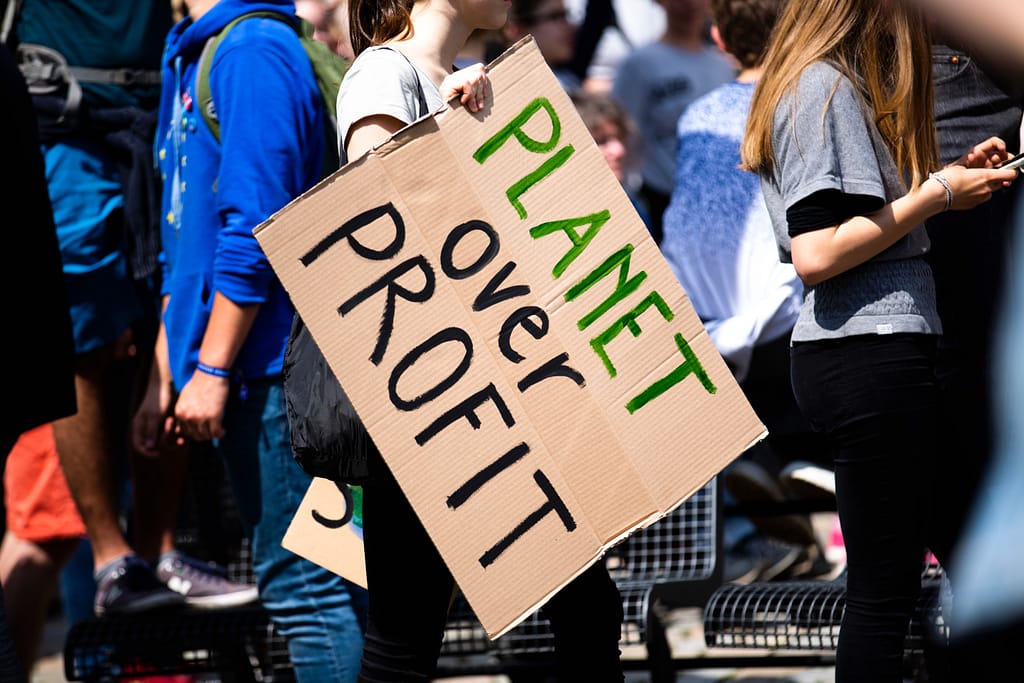The new economy is a term that calls for a fundamental redesign of the global economic system to address global environmental challenges and achieve equity for all. This article outlines how Metabolic Ventures defines and embodies its principles.
One common drawback in the sustainability sector is that it can be awash with buzzwords such as sustainable, circular, and regenerative. This problem is not unique to this space (for example, innovation in the business domain), however, the overuse and dilution of these terms have necessitated serious practitioners to clarify their definitions and use clear language.
For a term like the “new economy”, that challenge is compounded by two factors.
The first is that the term itself has already been used to describe something quite different. It emerged in the 1990s to describe the disruptive impact of the internet and software on economic activities and business models – causing a shift from traditional manufacturing and commodity-based economies to ones driven by knowledge, information, and digital technology. The second is that the term is inherently vague and therefore open to interpretation.
There are a variety of opinions across the political spectrum about what a new economy should look like and what principles it should adhere to. For some, a new economy is simply about more progressive taxation and applying responsible business principles like polluters-pay. For others, a new economy involves changing how we measure economic growth and societal progress, pricing externalities (i.e. charging for the hidden costs of economic activities, such as pollution or resource depletion, that affect society or the environment but are not included in the market prices), and implementing new policy reforms. For those who believe in the need for more radical reform, a new economy involves a complete systems transformation, including an emphasis on degrowth.
This article does not attempt to settle that debate, but rather to outline:
- Why a new economy is being called for
- Our principles of a new economy
- How we embed those principles in our work
- Further resources worth reviewing

Why a new economy?
The need for a new economic model arises from the pressing environmental and social challenges we face, which are rooted in the limitations of our current economic system.
Existential environmental limits
A relentless pursuit of economic growth has led to the overexploitation of natural resources, pushing the planet way beyond its biophysical limits. Climate change may become irreversible after 2030, and the window for action is closing quickly. Climate change is a symptom of a larger problem, and climate scientists are therefore calling for transformative economic policies to achieve a sustainable level of emissions. And our environmental challenges go far beyond climate change; the drive for growth is depleting resources like water, soil, and valuable metals. Average wildlife populations have dropped by 73% percent since 1970. Creating an economy within planetary boundaries requires reorienting economic activities to respect the finite capacity of Earth’s systems—such as stabilizing greenhouse gas emissions below critical thresholds, maintaining biodiversity to support the functioning of ecosystems, and reducing resource use to levels that natural systems can regenerate.
Economic financialization
“Financialization” refers to the increasing dominance of financial motives, markets, actors, and institutions in the operation of domestic and international economies. For example, the market for derivatives (contracts that bet on the future performance of things like assets, commodities, or currencies) is estimated to be 20 times larger than the global economy. This shift has not only moved significant wealth away from the production of goods and services toward finance, but has also influenced everyday necessities; it turns things people rely on every day like housing, food, and land into tools for making money for a limited number of people – augmenting price increases and inequality.
Social inequities
Our current economic system concentrates wealth and power in the hands of a few, creating vast economic inequalities that are increasing; current global inequalities are close to the peak levels observed in the early 20th century. Those with wealth find it easy to generate even more wealth (through investments, speculation, and influence), while those working normal jobs have seen their wages stagnate or even decline compared to the costs of living. This dynamic is making it difficult for people to afford basic needs, even if they are working hard, and can lead them into debt traps. High levels of inequality can lead to political and economic instability, as seen in historical events like the Great Depression and the more recent Great Recession.
There are many other issues to potentially cite here, including the growing power of big business, the revolving door between regulators and the regulated, and the short-termism exacerbated by quarterly earnings pressures and laws governing fiduciary duty. Many books have been written on these and other topics, including some of the resources we have added at the end of this article. Suffice it to say that environmental, economic, and social factors suggest an urgent and even existential necessity to transition to a new economic model.
What are the principles of a new economy?
For Metabolic Ventures, a new economy is restorative (such as through practices that heal ecosystems or improve social well-being), sustainable (uses resources wisely and avoids transgressing planetary boundaries), and progressive (prioritizes fairness, equality, and ensures that everyone has opportunities to thrive). A new economy includes the following principles:
- Inclusive economics – Emphasizing human well-being and social equity over profits, and ensuring the financial system is in service of the real economy
- Embracing ecological limits – Acknowledging planetary boundaries and prioritizing environmental health as the basis for societal functioning
- Alternative metrics – Focusing on holistic measures of progress that go beyond GDP like well-being, health, education, and environmental quality, such as the Genuine Progress Indicator (GPI) and Human Development Index (HDI)
- Circular value chains – Transitioning from a linear “take-make-dispose” model to one in which materials are cherished, reused, and repaired, or at least genuinely recycled
- Regenerative practices – Promoting practices that move beyond sustainability to actively restore and enhance natural ecosystems
- Shared benefits and agency – Mainstreaming forms of organizing that emphasize collective action that prioritizes people over profits

How these principles influence our work at Metabolic Ventures
At Metabolic Ventures, we seek to embody these principles as an organization and apply them to the organizations we create and support. We apply them to our work in the following ways:
Solving challenges holistically
Metabolic, at its core, is focused on environmental issues. But in our mission to build the foundations of a new economic system, we see a critical need to look more holistically at the interlinkages between social, economic, and environmental goals. For instance, within Fresh Ventures, our thesis has put farmers and economics at the center of the transition to regenerative agriculture. Likewise, our work around cooperative housing development and Community Land Trusts (CLTs) embraces evidence that such initiatives lead to much stronger environmental outcomes and that access to affordable housing enables more people to pursue purpose-driven careers.
Exploring the playspace of hybrid organizational typologies
Many frameworks segment society into clear buckets, with walls between government, business, and civil society. We see exciting opportunities in the spaces in between. Publicly governed utilities, agricultural cooperatives, financial credit unions, and many other related constructions can take the best qualities of these three segments. For instance, within Gov4aLL, we are supporting non-profit agricultural living labs (located throughout Southern Europe) to provide valuable services to their constituents that improve soil health and develop sustainable models of governance and finance. Thinking in terms of “utilities” – in service of a need, operating like an efficient and innovative business, and ensuring profits serve a purpose – is an important guiding philosophy.
Seeing profit as a means to an end, not an end in itself
We believe that organizations should essentially be not-for-profit. That does not necessarily mean non-profit, but it means that profit should not be the underlying and primary purpose of organizations. Instead, profits should be in service of an organization’s purpose and/or be fairly distributed to employees and communities. When profit becomes the prime objective, incentives ultimately lead to negative outcomes. In our work, we believe that both entrepreneurs and investors should have clear financial returns (IE, “upside”) from taking risks with their human and financial capital. But at some point (which is usually defined up front), a successful initiative will compensate actors for that risk and effort, and otherwise put profits toward expanding the impact or achieving the mission of the organization. This is one of the key tenets of steward ownership, which we embed in ventures we support and venture programs we implement, such as within Fresh, the Circular Innovation Collective, or the SoTecIn Factory.
Focusing on achieving purpose over growth
Generally, organizations with an effective solution seek traditional growth – growing bigger and scaling to serve more people. Sometimes this is the right strategy and such growth is aligned with the desired purpose; for instance, a solar panel installer will, by installing more solar panels, generate more impact alongside growing its revenue and number of employees. Most organizations have some sensible economy of scale in which certain overheads can be more efficiently spread across a larger group of people or units of service. But often this traditional view of growth misses out on other methods of fulfilling a purpose and scaling positive impact that can be more effective and do not involve growing an organization’s size or income. For example, opening up intellectual property, making it easy to replicate a proven model, developing assets collectively, taking a smart approach to policy advocacy, or effectively achieving mindset and cultural shifts are all methods of fulfilling a purpose and expanding positive impact without necessarily growing an organization’s size or revenue base. Within ventures we build, we prioritize achieving purpose – avoiding growth for the sake of growth without a rationale for how it connects to the inherent purpose and impact strategy of an organization.
Closing Thoughts & Further Reading
Our sense of what a new economy should look like continues to evolve, as does how we implement its principles in our work.
For more content to dive into, check out some of the resources below.
Articles and Resources
- Pathways to a People’s Economy Toolkit – The New Economy Coalition
- Field building Initiatives in the New Economy – Platform for a New Economy
- Publications mapping the DNA of a democratic economy – Democracy Collaborative
- The seven pillars of the circular economy – Metabolic
- Rethinking business and economic paradigms for people and planet to survive – UN OHCHR
- Achieving a Well-being Economy – New Economy Foundation
- Why we need to move towards an economy that can regenerate itself – Kate Raworth
- Restorative Economics: A Values-Based Roadmap to a Just Economy – Nwamaka Agbo
Books
- “The Value of Everything: Making and Taking in the Global Economy” by Mariana Mazzucato
- “Capital in the Twenty-First Century” by Thomas Piketty
- “The Price of Inequality: How Today’s Divided Society Endangers Our Future” by Joseph E. Stiglitz
- “This Changes Everything: Capitalism vs. The Climate” by Naomi Klein
- “Doughnut Economics: Seven Ways to Think Like a 21st-Century Economist” by Kate Raworth
- “The Growth Delusion: Wealth, Poverty, and the Well-Being of Nations” by David Pilling
- “Prosperity without Growth: Foundations for the Economy of Tomorrow” by Tim Jackson
- “Other People’s Money: The Real Business of Finance” by John Kay




